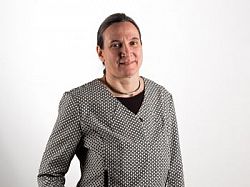IWD 2016: Claudia Eberlein - Tenacity is the most important trait for female scientists in the UK
Professor Claudia Eberlein is Head of the Department of Physics and Astronomy and is involved in the University of Sussex’s Athena SWAN initiative to encourage more women into science professions.
 Professor Claudia Eberlein
Professor Claudia Eberlein
I always liked maths and it came to me easily. When Rubik's cube first came out in the late 70s (and there were no solutions published anywhere) my classmates all gave up on it pretty quickly. We were on a school trip then; at lunch on the second day I put the finished cube in the middle of the table.
In my view children who are gifted at maths are not offered enough challenges and opportunities in Britain. I grew up in East Germany and we had maths and science Olympiads at all levels, so talent was spotted and nurtured.
It was quite normal in East Germany for a woman to work and not unusual for her to want to be a scientist. There wasn’t the same wide-spread promotion of pre-conceived ideas of what might be a suitable job for a woman as here today, nor as many practical obstacles. There was plenty of affordable childcare, which cannot be said about the UK now.
As an undergraduate in physics at the University of Leipzig I applied to come to Sussex an exchange student for a year. However, this was before the Berlin Wall came down, and I wasn’t allowed to leave the country.
I didn’t take part in any of the demonstrations in Leipzig in 1989 that eventually made the Berlin Wall come down as I was indoors focussing on writing my Masters thesis. I managed to obtain a British Council Know How Fund scholarship for studying in the UK and I came to Sussex to do my PhD. As well as fulfilling my academic and research ambitions, this step was a welcome escape from West German perfectionism and bureaucracy that were taking over the whole country with the German reunification in 1990, hand in hand with a drive of women back into the role of housewives. I have felt most at home in Britain ever since. The situation for women in science wasn’t exactly rosy, but at least it didn’t evolve in the wrong direction.
Physics interests me because I like applying maths to the real world. My area is theoretical physics. I don’t deal with the behaviour of particles in big accelerators or the early universe, but with the description of very small systems in much more mundane settings. For that one needs quantum mechanics and quantum field theory. My research makes essential contributions to the further development of nanotechnology. I often get a blank stare from people when I try to explain what I do, but then I explain to them that they wouldn’t have a DVD player without my field of research – because the laser diode that reads the DVD is an example of such a nanotech device and indispensable in the modern world.
I also love teaching and have received several teaching awards at Sussex. I am always trying my very best to get my excitement about science across to others and make my subject more accessible. Physics isn’t for nerds. Everyone can do it and get something out of it.
Women wanting to pursue science need to support each other, stick to their guns, and just keep at their chosen discipline no matter how hard others are trying to put them off, consciously or unconsciously. I really loved it when some of our female graduate students got very incensed recently when they were offered a female-only training course by a research institution; they asked whether the slides in the presentations were all pink or why this had been put on. The fact that they spoke up so vigorously makes me optimistic that my daughter will have an easier time when she starts university in a decade from now. Maybe she’ll even manage to get herself a househusband who, without feeling the odd one out, is happy to look after my grandchildren while she pursues a career as a scientist.
